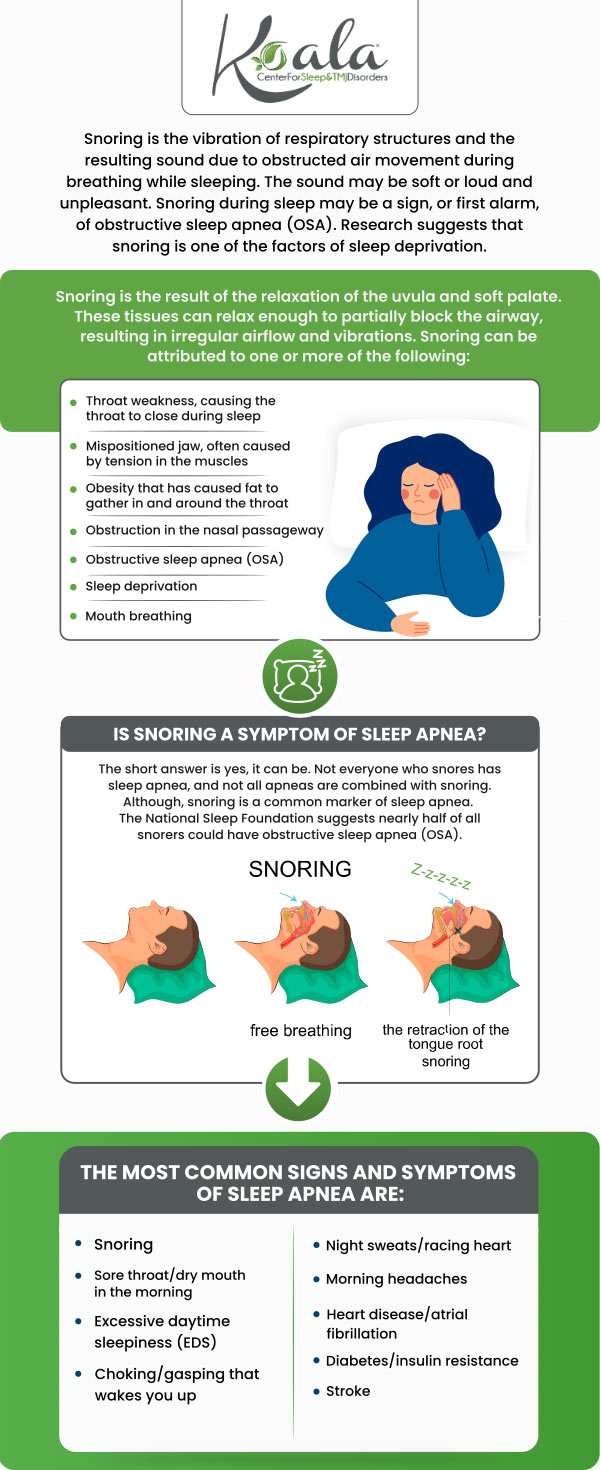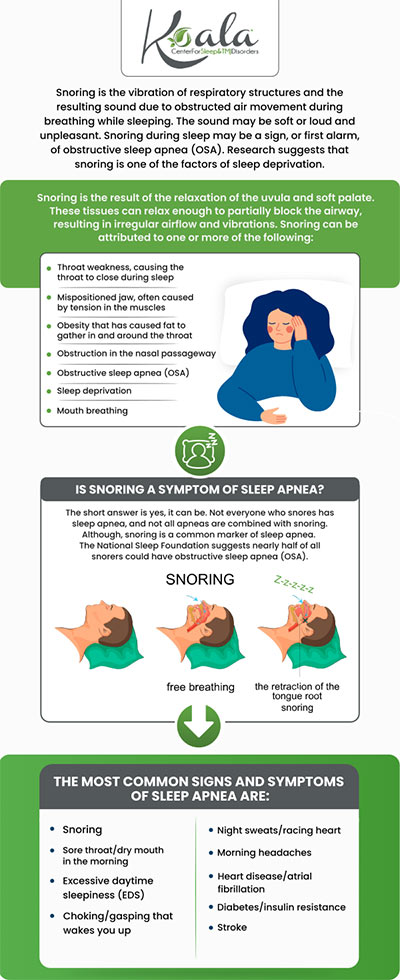Is it Snoring or Sleep Apnea?
About 87% to 90% of people who snore have sleep apnea, and clinical data says that snoring is generally associated with sleep disorders. If you have doubts that your condition is more than just snoring, come to Koala® Center For Sleep & TMJ Disorders. For more information, contact us or visit us online to book an appointment. We have convenient locations across the U.S. in Bloomington IL, Peoria/Dunlap IL, El Paso TX and Wausau WI.


Table of Contents:
Does sleep apnea cause snoring?
How can you tell the difference between sleep apnea and snoring?
How do you help with sleep apnea and snoring?
Do I need a CPAP machine if I snore?
Sleep apnea is a medical disorder that causes breathing to stop for short periods of time, often multiple times, during sleep. It is commonly caused by a blockage of the airway, typically due to the tongue rolling back and obstructing the airway, but also from the muscles in the throat relaxing. Sleep apnea can be extremely dangerous and may lead to many long-term health complications, including high blood pressure, heart attack, and stroke; it may even be fatal. It is estimated that around 18 million Americans are currently living with some form of sleep apnea and many remain undiagnosed, making it a significant public health issue.
Yes, sleep apnea causes snoring. However, some people with sleep apnea do not snore, and many people who snore do not have sleep apnea. While snoring is often associated with sleep apnea, not all snoring indicates this condition. For example, snoring linked with sleep apnea is more so characterized by loud, abnormal, and arrhythmic snores, coupled with gasps for breath or wheezing-like sounds.
While sleep apnea and snoring are closely related, they are not mutually exclusive—one can occur without the other. Snoring is defined as a snorting or grunting sound made during sleep; it is often rhythmic and can range from soft and quiet to loud and disruptive. The snoring associated with sleep apnea is different from normal snoring, and is less rhythmic, sounds kind of like gurgling, and is often heard alongside pauses in breathing or gasps for breath.
Snoring on its own is not considered dangerous to your health, but sleep apnea can be a serious condition that needs to be treated right away in order to prevent limitations and obstructions to quality of life.
Sleep apnea is a complex sleep disorder that can cause a number of complications. Because it restricts airflow while asleep, many people with sleep apnea experience problems associated with lack of oxygenation. When the brain is deprived of oxygen, it cannot function properly and can experience permanent damage. A common sign of lack of oxygen in the brain is headaches; if you are waking up with headaches, you should seek treatment as soon as possible to prevent avoidable complications. The gold standard in sleep apnea treatments is CPAP therapy. CPAP, which stands for continuous positive airway pressure, involves a machine that supplies continuous pressure to the airways, preventing them from becoming blocked and restricting airflow. A mask is worn over the mouth and nose and is connected to the CPAP machine via a hose.
No, you do not need a CPAP machine if you only snore; these devices are intended to treat sleep apnea, preventing pauses in breathing during sleep. If you snore and wake up with a headache or sore throat more than once a week, you may have sleep apnea, in which case, you may need CPAP therapy.
If you believe that you or someone you love has sleep apnea, the sleep specialists at Koala® Center For Sleep & TMJ Disorders can help you confirm the diagnosis and develop an effective treatment plan custom-tailored to your needs. We serve patients from all across the United States, and currently have seven locations, including: one in El Paso, TX; one in Wausau, WI; one in Mishawaka, IN; one in Peoria – Dunlap, IL; and one in Bloomington, IL. Schedule an appointment with an experienced TMJ disorder specialist at any of our locations today to receive top-level care! We look forward to serving you!

Additional Services You May Need
▸ KoalaKIDZzz®
▸ Sleep Apnea
▸ Snoring
▸ TMJ Disorder
▸ Fatigue
▸ Sleep Disorders
▸ Weight Loss
▸ CPAP Alternative
▸ Oral Appliances




